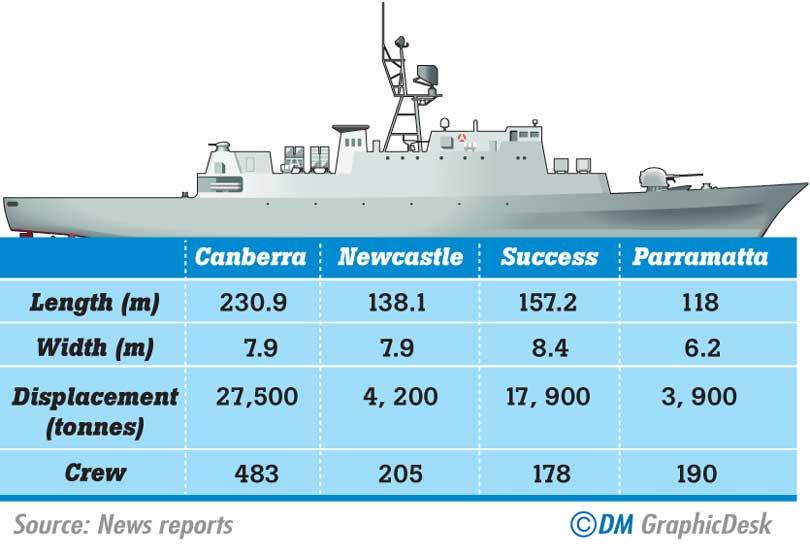Reply To:
Name - Reply Comment
Last Updated : 2024-04-26 10:47:00

 Four Royal Australian Navy ships and around 1000 defence personnel have arrived in Colombo and Trincomalee for Australia’s largest -ever military exercise with Sri Lanka.Colombo is the first stop of a regional mission, Code named Indo-Pacific endeavour 2019 (IPE 19); ships will travel to India, Malaysia, Thailand, Vietnam, Indonesia, and Singapore before returning to Australia.
Four Royal Australian Navy ships and around 1000 defence personnel have arrived in Colombo and Trincomalee for Australia’s largest -ever military exercise with Sri Lanka.Colombo is the first stop of a regional mission, Code named Indo-Pacific endeavour 2019 (IPE 19); ships will travel to India, Malaysia, Thailand, Vietnam, Indonesia, and Singapore before returning to Australia.
The latest engagement is a highlight of Canberra’s growing interest in regional defence cooperation in the wake of China’s rising military and economic clout and expansive geo-strategic claims and dwindling American influence and prestige in the region under Donald Trump.
In Sri Lanka, the Australian and Sri Lankan defence forces will work together on disaster assistance planning, naval maneuvers, and military training activities to improve cooperation, familiarity, and inter-operability during their week long security engagement.
The ADF personnel will also visit several Sri Lankan military training establishments during their stay. “This is our first stop in the IPE19 mission, it is an important stop given the history Sri Lanka holds in the Indian Ocean in the present time and, I believe, the future,” said Air Commodore Richard Owen, Commander of the Joint Task Force. “We would like Sri Lanka to have us as a strategic partner in the Indian Ocean,” he said.
Recently, Sri Lanka has been attracting quite a bit of attention from regional and extra- regional powers, ranging from the USA, Japan, Australia, Korea and India. There are two main reasons: its strategic location astride to shipping routes in the Indian Ocean where PLA Navy is increasingly active as well as China’s expanding geo-economic foothold in the island.
The government in Colombo flaunts new defence and diplomatic ties asa triumph of its foreign and domestic policy. Its Navy has received a several gifts of decommissioned coast guard cutters, and patrol boats from America, Japan, and Australia as it aspires for a more active constabulary role in the Indian Ocean region. Also joint military exercises with foreign partners have grown in number and quality.Sri Lanka also held its annual field military exercise, Cormorant Strike IX-2018 in September, last year with 100 foreign observers and participants. The United States marines and US Naval Special Warfare forces had conducted regular military training exercise with their Sri Lankan counterparts. Japanese Maritime defence forces held a joint military exercise with the Sri Lankan Navy in October last year.
The West leaning the UNP government has historically been friendlier towards the West than the SLFP. The foreign policy realignment under the UNP came after considerable international isolation during the Rajapaksa era. It of course helped Sri Lanka mend its ties with the West and redeem its international image.
However, the Western interest in Sri Lanka is much more than due to that its new government restored rule of law after the arbitrariness of the Rajapaksa regime; or its key protagonists think it is posh to rub shoulders with Ms Samantha Power.
Western interest in Sri Lanka is first and foremost driven by their systemic imperatives, dictated by the rise of China and fear and uncertainty it caused in rival powers. Australia’s defence whitepaper of 2009 identified China as a military threat, its 2016 whitepaper did so in a rather measured tone. On both instances, it drew ire from China. The 2016 whitepaper also recommended a large scale military modernization, including acquisition of a fleet of world’s most advanced conventional submarines, and anti-submarine frigates, to keep a tab on growing PLA Navy military assets in the region, and its expansive claims in the South and East China Sea.
America has been assertive in countering China’s claims in the South China Sea and early this month flew bombers over the disputed waters twice and conducts regular freedom of navigation exercise in the disputed waters.
Pacifist Japan, over which China has unresolved historical grievances and contested claims for islands has stepped up its military cooperation with India. In addition to the annual Malabar naval exercise that India holds with the USA and Japan, Tokyo is also exploring to hold joint ground troops exercise with India.
Sri Lanka is desiring for an enlarged regional role as an upholder of rule- based order of the international system. It is generally argued that the interests of small states are better served when the rule based order is upheld and respected. Its distinctive values, norms, laws, and institutions that are designed to inform and govern state conduct generate a degree of certainty and reduce anarchy of international system. In the absence of this rule based order, the alternative is as 4th century BC Athenians said, ‘strong does as he pleases, and weak suffer as they must.’
The problem with China is that despite its stated commitment to the rule based global order ( and being the country that had most benefited from it over the three decades) in practice, China’s adherence is selective, arbitrary and is only when it serves its interests, be it in the South China Sea, intellectual property rights, access to foreign firms to local market etc.
The dilemma that Sri Lanka would face is that the line of demarcation between being an upholder of rule based order and being party to a Western led evolving soft balancing strategy against China is blurry. It is not always easy to say for sure where the former ends and the latter begins. This is compounded by the absence of realist oriented foreign policy making, a historical lacuna in Sri Lanka’s foreign policy, which is regularly being dictated by personal, political and ideological interests of ruling elites. Whereas successful countries conduct their foreign policy to advance the self- interest of their respective states.
It is natural for China’s rise to create reactions in the international system, that would lead threatened states to form overt and covert alliances and to resort to internal means of propping up their military capacities. The Evolving US, Japan, India, Australia defence cooperation is an example.
However, small states can also benefit from the systemic opportunities created by the power transition to the East, and rise of China. That requires their leaders to identify the core- national interests and place a calculated bet on the present and future trajectory of the international politics. Betting against China is not the most rational choice for Sri Lanka.
In a more common sensical assessment, the western interest in Sri Lanka is largely due to the first mover advantage, China acquired by building roads and taking a stake in the Hambantota port. Other states have rushed to Colombo since then for their absence would mean they will miss out on Sri Lanka.
China’s initial inroads effectively helped Sri Lanka diversify its foreign policy relations
Thus, China’s initial inroads effectively helped Sri Lanka diversify its foreign policy relations. However, still, given its vast economic clout, China reigns over the rest in terms of its contribution, both present and potential, to Sri Lanka’s economic progress. There is a symmetry of interests in China’s belt and road initiative and developing world countries’, including Sri Lanka’s national imperative to address infrastructure backlog. Several on-going infrastructure projects such as Colombo Port City, Hambantota Port and EPZ could offer Sri Lanka an opportunity of life time to give a shot at prosperity.
Therefore, no moralistic or egoistic yearnings to be seen, even remotely, in a Western balancing initiative against China can justify the huge opportunity cost such a fallacy would entail. Chinese officialdom is exceptionally thin skinned and oversensitive to breach of Chinese sense of political correctness. In fact, the government ministers confide that unusual delay in obtaining Chinese loans and lengthy bargaining over investment projects are not so subtle means of Chinese response to the government’s less than ideal treatment of Beijing.
It is alright for Sri Lanka to seek a greater role in upholding rule based order. Though in practice, such noble intentions would be scaled down by lack of power. However, Sri Lanka should know where to draw the line. It should eschew any role in balancing maneuverings against China, because that is not worth its cost.
Follow @RangaJayasuriya on Twitter

Add comment
Comments will be edited (grammar, spelling and slang) and authorized at the discretion of Daily Mirror online. The website also has the right not to publish selected comments.
Reply To:
Name - Reply Comment
US authorities are currently reviewing the manifest of every cargo aboard MV
On March 26, a couple arriving from Thailand was arrested with 88 live animal
According to villagers from Naula-Moragolla out of 105 families 80 can afford
Is the situation in Sri Lanka so grim that locals harbour hope that they coul